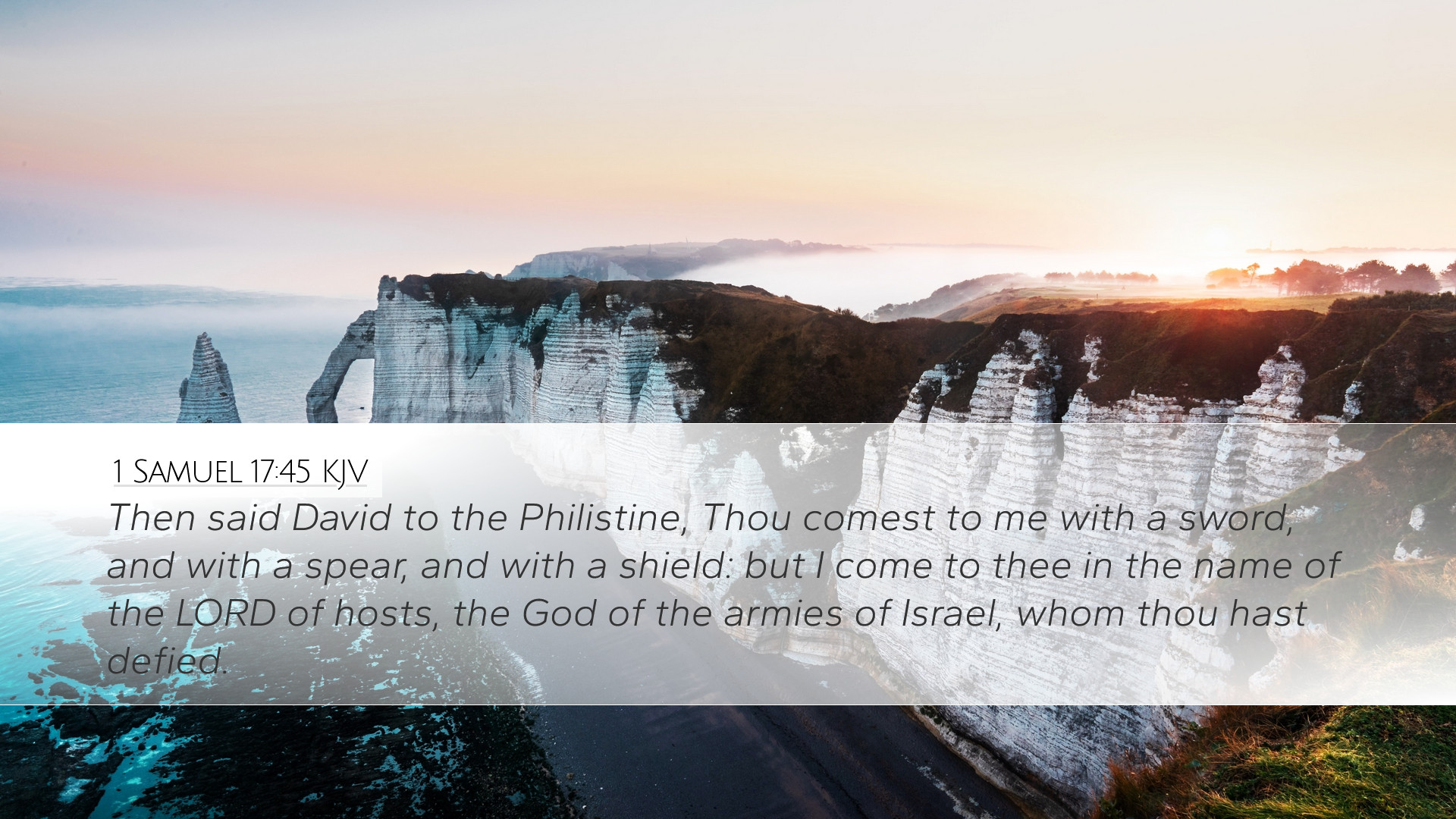Commentary on 1 Samuel 17:45
Verse (1 Samuel 17:45, KJV): "Then said David to the Philistine, Thou comest to me with a sword, and with a spear, and with a shield: but I come to thee in the name of the Lord of hosts, the God of the armies of Israel, whom thou hast defied."
Contextual Overview
This verse occurs within the well-known narrative of David and Goliath, where David confronts the giant warrior of the Philistines. The backstory involves Israel’s fear in facing Goliath, who had taunted them for forty days (1 Samuel 17:16). David, a shepherd boy, is chosen not for his stature, but for his faith in God and his experience in defending his flock against lions and bears.
The Nature of Conflict
David recognizes the nature of the battle he is entering—a spiritual confrontation more than a mere physical one. His words highlight the difference between earthly reliance on weapons and the divine source from which he draws his strength.
Insights from Matthew Henry
Matthew Henry emphasizes the importance of David's confidence in God, pointing out that he approaches Goliath, not armed with traditional weapons but cloaked in faith. Henry writes:
"David did not rely on his slingshot and stones, though they were his tools; rather, he approached the battle in the name of the Lord, grounding his confrontation in divine authority."
Perspective from Albert Barnes
Albert Barnes draws attention to the spiritual implications of David's declaration. He notes:
"David's acknowledgment of the Lord of hosts signifies a recognition that the battle is the Lord's. He underscores that the power of God can prevail against seemingly insurmountable odds, a fundamental truth for believers facing their own giants."
Comments by Adam Clarke
Adam Clarke delves into the theological ramifications of the name of the Lord, suggesting that:
"To come in the name of the Lord indicates a representative authority. David symbolizes a believer who, through faith, stands as a proxy for God’s people against the antagonist forces that challenge their faith."
Theological Implications
- The Name of the Lord: The 'name of the Lord' serves as a reminder of God's character and promises, rallying David's courage.
- Tension of Faith vs. Fear: This passage encapsulates the theme of faith overcoming fear—a vital lesson for leaders and believers.
- Divine Authority: The supremacy of God in battle reinforces the belief that no earthly force can stand against the Lord’s might.
Application for Pastors and Theologians
For pastors, this verse can be a source of encouragement when addressing congregational doubts. It establishes that God equips those who trust in Him with the necessary wisdom and strength to confront challenges—whether personal or communal.
Practical Lessons
- Empowerment in Leadership: Much like David, leaders are encouraged to rely on their relationship with God more than political or social status.
- Faith-Centric Ministry: The reliance on prayer and God’s word should underpin all forms of ministry outreach, especially when facing adversity.
- Encouragement to the Faint-Hearted: This narrative can inspire those who feel overwhelmed by life’s struggles to remember that God fights their battles.
Conclusion
1 Samuel 17:45 serves as a powerful reminder of the nature of true strength and dependency on God. The insights drawn from the commentaries of Henry, Barnes, and Clarke coalesce into a robust theological understanding that faith should guide the believer’s actions, particularly in moments of crisis. Embracing this scripture is vital for anyone seeking to understand the dynamics of God’s power manifest through human courage.


